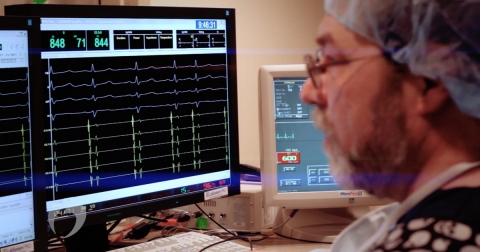What treatment options are available for atrial fibrillation?

Every patient diagnosed with atrial fibrillation (aka AFib or AF) is unique — the length and frequency of their irregular rhythms vary, they have different health histories and risk factors, and they may respond differently to available treatment options. Your doctor at the Oklahoma Heart Hospital will work with you to determine the best course of action to help you manage AF and reduce your risk of stroke. A few treatment options that your doctor may recommend include blood thinners, cardioversion, antiarrhythmic medications, and catheter ablation.
While AF on its own is not life threatening, it does increase the risk of stroke. Therefore, most people diagnosed with AF will be prescribed a blood thinner to help reduce that risk. In most cases, the patient will continue taking a blood thinner in conjunction with any other recommended treatment options.
Antiarrhythmic medications are usually the first line of therapy when treating patients with AF. There are several types of antiarrhythmic medications that can be prescribed, and a patient may need to try more than one option to find the best fit. Because this type of medication can help prevent a patient from going into AF, a patient will often need to take this medication for the foreseeable future. As with any prescribed medication, it is important to talk to your doctor about any other prescription medications, over-the-counter medications, or herbal supplements you are taking while taking any antiarrhythmic drugs.
For patients who are newly diagnosed with AF, your physician may use an electrical cardioversion to try and reset your heart’s rhythm back to normal. Even if your rhythm returns to normal following a cardioversion, it may not stay that way. Your doctor will monitor your heart rhythm and may also prescribe antiarrhythmic medication to help maintain the regular rhythm.
For many patients, the combination of a blood thinner and antiarrhythmic medication helps control their AF so that no other treatment is needed. Other patients, however, may fail antiarrhythmic drugs and require a catheter ablation procedure. An ablation uses catheters (long wires) that are inserted in the groin and then guided to the heart. Once in the heart, your doctor can identify the tissue causing the irregular rhythm and use either “heat” (radiofrequency ablation) or “freezing” (cryoablation) techniques to destroy the electrical activity responsible for AF. The ablation procedure takes a few hours plus an overnight stay in the hospital for monitoring, but recovery time is quick for most patients. While ablation does not eliminate the risk of stroke, it can eliminate the irregular heart rhythm and help patients feel more like themselves on a daily basis.
If you have questions about AF and the treatment options available, contact an Oklahoma Heart Hospital physician today. We can help design a treatment plan to control your AF, reduce your risk of stroke, and get you back to your regular activity level.




